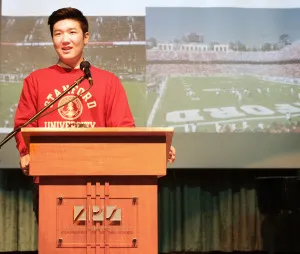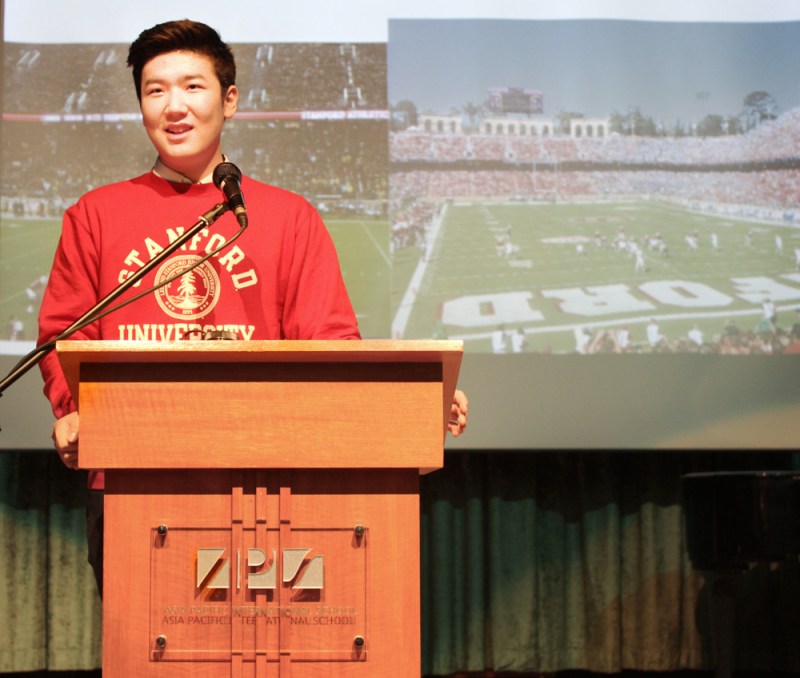
An auditorium full of Korean high school juniors and seniors listened as one of their alumni, Joon Kee Park ‘17, offered a presentation about his first quarter at Stanford—about freshmen dormitory life, the difficulties of waking up any time before 10 in the morning and meeting many brilliant classmates.
Park, like most students, returned home for winter break. However, Park had work to do through Admissions Ambassadors, a program the Office of Undergraduate Admission piloted this school year.
Before the break international students were trained to act as ambassadors of Stanford while they were back home. The Admissions Ambassadors program was formed in order to further Stanford’s reach to international students, connecting international high school students directly with student representatives.
The new program is similar to the existing domestic equivalent, the Going Home Program, through which volunteering students return to their former high schools in the United States.
According to Theresa Bruketta, associate director of admission and international outreach, 40 students representing 18 countries—including Macedonia, Vietnam, Jamaica and Saudi Arabia—participated in the program’s inaugural run.
Bruketta hopes that this program may convince more high school students to pursue a college degree outside of their native country.
“For many students applying to Stanford from overseas it is not possible to visit our campus or meet someone from our community before they apply,” Bruketta said. “For some, even after they are admitted, they will not even have the opportunity to set foot on our campus until orientation.”
Park echoed this sentiment, saying that he believed he made an impact on the high school students he spoke to.
“Maybe not the people applying right now but I know the wave after came and told me ‘Maybe I’ll apply now,’” he said, of potential applicants from his school.
Park also expressed that this program would have been helpful while he was applying.
“It would have been nice to get a better feel of the school from someone who works or has been there rather than the Internet,” Park said.
Any student who attends school outside of the United States—regardless of citizenship status—is able to become an ambassador, according to Andres Gutierrez ‘14, admission associate who was part of the recruiting effort for the Ambassadors program.
Park himself first became interested after his admissions officer encouraged him to apply to help reach out in his native South Korea.
“I first found out about it when I introduced myself to the admissions officer because I couldn’t come to Admit Weekend because I was international,” Park said.
After fall quarter, Park returned to his high school in Seoul and contacted his school’s principal to ask if he could present his 30-minute PowerPoint on campus life. The well-attended talk was followed by a free question-and-answer period.
“They asked if it was more difficult than high school, they asked about things like time management, parties, fun opportunities and how I think it’s different from other schools I didn’t choose,” Park said.
Park had organized his visit and structured his presentation following training from the Admission Office. In addition to guidelines for his presentation, he received a stack of pamphlets for his return home and was encouraged to answer questions about his experience at college as opposed to admissions information.
“The Ambassador Program does not aim to provide specific details about Stanford’s selection process or to provide advice about how to gain admission but rather focuses on the Stanford experience,” Bruketta said.
Currently, the Admission Office is compiling reflections from the ambassadors about their experiences to guide the program better next year.
“I am working with Theresa on gathering feedback from the ambassadors on their visits so that we can ensure that it was helpful and learn how to develop the program for future iterations,” Gutierrez said.
Contact Alex Zivkovic at aleksa ‘at’ stanford.edu.
